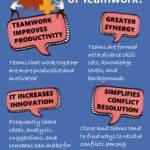
Here are the reasons why communication is important in a team
Builds healthy work relationships, in any corporate culture, it’s important to have a connection with your co-workers. Research shows that happier employees have higher productivity levels, meaning that you, as a leader, can’t go wrong by investing in team communication.
People have psychological needs; they want to be understood, validated, and accepted. In a workplace culture, it does not change.
Healthy work relationships can increase self-esteem and job satisfaction, improve employee retention, and create a more stable work environment.
Team communication in a professional, in-person context can build positive work relationships. However, in a distributed team environment, poor communication can erode work relationships.
It is due to inconsistency and a lack of communication and appreciation. Companies must take advantage of digital communication tools to keep the team connected and together in such a case.
If you want to improve employee engagement in your workplace, having a clear, concise, and consistent set of communications practices in place is crucial. Effective team communication clears employee doubts and helps them brainstorm ideas and doubts with their peers and managers.
Team communication encourages a culture of recognition in the workplace. Recognition is a great way to motivate employees and boost their morale.
When you foster a culture of strong internal team communication, team members acknowledge each other’s accomplishments. It creates a sense of belonging among the team members, which keeps them more engaged and satisfied.
Employee wellbeing is critical for an organization to succeed. If your workforce is not physically and psychologically healthy, it directly impacts their performance.
Employees’ productivity can drop when they are not in regular contact with their colleagues and team leaders. When team members feel undervalued because they aren’t receiving the interactions they need, they will also feel unwell.
In addition, most of the global workforce has adapted to the remote or hybrid work culture after the pandemic. The sudden shift has changed the team dynamics since employees can no longer communicate in person, resulting in stress and anxiety.
When employees keep open communication and share their experiences related to any issues, it keeps them emotionally healthy. Finding ways to bridge that gap and providing the right remote communication tools is the key.
(Reference: https://www.rocket.chat/)


